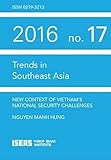New Context of Vietnam's National Security Challenges / Manh Hung Nguyen.
Material type: TextPublisher: Singapore : ISEAS Publishing, [2016]Copyright date: ©2016Description: 1 online resource (33 p.)Content type:
TextPublisher: Singapore : ISEAS Publishing, [2016]Copyright date: ©2016Description: 1 online resource (33 p.)Content type: - 9789814311144
- 9789814311151
- online - DeGruyter
- Issued also in print.
| Item type | Current library | Call number | URL | Status | Notes | Barcode | |
|---|---|---|---|---|---|---|---|
 eBook
eBook
|
Biblioteca "Angelicum" Pont. Univ. S.Tommaso d'Aquino Nuvola online | online - DeGruyter (Browse shelf(Opens below)) | Online access | Not for loan (Accesso limitato) | Accesso per gli utenti autorizzati / Access for authorized users | (dgr)9789814311151 |
Frontmatter -- FOREWORD -- New Context of Vietnam's National Security Challenges -- New Context of Vietnam's National Security Challenges
restricted access online access with authorization star
http://purl.org/coar/access_right/c_16ec
Vietnam's concept of national security is based on "the survival of the ruling regime that acts in the name of the country". This is unlike in many countries where national security relates merely to the survival of the state. Because the challenges to Vietnam's national security are perceived as challenges and threats to the ruling regime, the concept of national security tends to focus on the internal dimension of national security. The Mid-term National Congress of the Communist Party of Vietnam (CPV) in 1994 listed "four threats" facing the country, namely, the danger of falling behind neighbouring countries economically; the threat of "peaceful evolution"; deviation from socialism; and corruption and bureaucratism. None of them, except for peaceful evolution, comes from outside. Today, these threats remain but are now joined by the threat of "self-evolution" or "self-transformation" leading to socialist deviation and peaceful evolution, as well as the threat to national sovereignty and territorial integrity resulting from the conflict in the South China Sea. Consequently, the military is tasked not only with the mission of protecting the fatherland but also protecting "the party, state, people and the socialist regime". The Twelfth National Congress of the CPV in 2016 attempted to re-establish the control of the party over the state; to launch a renewed effort to combat corruption and purge the party of those who exhibited signs of degeneration in morality, political thinking and lifestyle; and earn the people's trust. Today, China is the only external threat to Vietnam's sovereignty and territorial integrity, and the focal point of that threat is the South China Sea. Vietnam has responded to this threat with a three-point policy: accommodating China's security interests; building up self-defence capability; and mobilizing international support. The strategy to mobilize international support is based on three elements: reliance on diplomacy and international law; mobilizing international support through integration in the regional and international system and a policy of "openness, multilateralization and diversification of foreign relations"; and soft balancing between the major powers. Recent serious challenges to Vietnam's national security policy include: the unpredictable politics of the United States over ratification of the TPP and uncertainty over its "pivot" to Asia strategy; President Rodrigo Duterte's tilt towards China, his country's "separation" from the United States, and the uncertain future of the U.S.-Philippines military alliance; China's strong reaction to the July ruling of the Permanent Court of Arbitration in favour of the Philippines, and a divided and weakened ASEAN.
Issued also in print.
Mode of access: Internet via World Wide Web.
In English.
Description based on online resource; title from PDF title page (publisher's Web site, viewed 30. Aug 2021)


